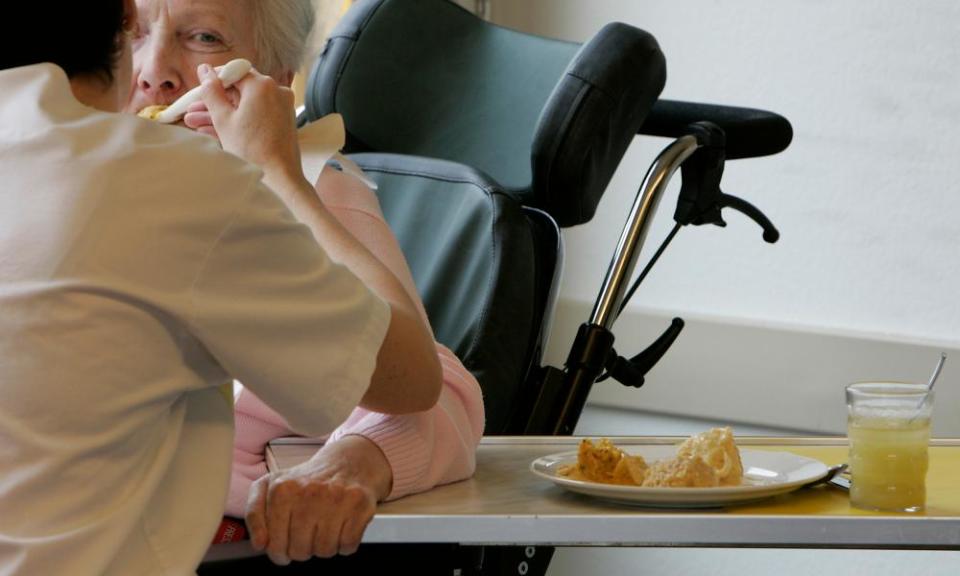NHS faces staggering increase in cost of elderly care, academics warn

The NHS and social care system in the UK is facing a staggering increase in the cost of looking after elderly people within the next few years, according to major new research which shows a 25% increase in those who will need care between 2015 and 2025.
Within eight years, there will be 2.8 million people over 65 needing nursing and social care, unable to cope alone, says the research – largely because of the toll of dementia in a growing elderly population. The research, published by the respected Lancet Public Health medical journal, says cases of disability related to dementia will rise by 40% among people aged 65 to 84, with other forms of disability increasing by about 31%.
The new figures follow a furore over the Conservative manifesto and Theresa May’s U-turn on social care this week. In a bid to keep the costs of care down, the manifesto said those needing care at home would have to pay until they had £100,000 in savings left, including the cost of their home.
After accusations that the Conservatives were imposing a “dementia tax”, May promised a cap on the amount any person would pay for care – although without specifying what the cap would be.
The new analysis will make grim reading for whichever party gains power. “The societal, economic and public health implications of our forecast are substantial,” say the researchers, led by academics from the University of Liverpool and University College London.
“Public and private expenditure on long-term care will need to increase considerably by 2025, in view of the predicted 25% rise in the number of people who will have age-related disability. This situation has serious implications for a cash-strapped and overburdened National Health Service and an under-resourced social care system,” they added.
The figures take account for the first time of the changing disease burden as well as the increasing elderly population and longer life expectancy. Cardiovascular disease, which can cause heart attacks and strokes, has gone down, but dementia is rising as people live longer. This makes the research an advance on previous studies, says Professor Stuart Gilmour of the department of global health policy at the University of Tokyo in a commentary published alongside the paper.
“The results show starkly the growing burden of disability that the UK National Health Service and social care system will face over the next decade,” he writes.
“[It] faces a rapid increase in the number of elderly people with disabilities … at a time when it is uniquely unprepared for even the existing burden of disability in the UK population. This important research should be taken as a warning and a strong call for action on health service planning and funding, workforce training and retention, and preparation for the ageing of British society.”
The government urgently needs to consider the options, says the paper. Firstly, more care homes are needed, it says. Secondly, there must be more support for informal and home care – they suggest tax allowances or cash benefits. “Affected individuals and their families pay an estimated 40% of the national cost of long-term care from income and savings,” they write.
But prevention is also vital. Poor diet, smoking, drinking heavily, high blood pressure, diabetes and little physical activity are risk factors for both heart disease and dementia, they say. Immediate investment in improving people’s lifestyles would pay dividends, they say. “We seriously need to protect the future of older citizens through prevention,” said lead author Dr Maria Guzman-Castillo of the University of Liverpool.
She said political parties had not so far been looking at the true scale of the crisis to come. “We think they are not looking at this. There is a gap between the academic community and the government,” she said.
Professor Helen Stokes-Lampard, chair of the Royal College of GPs, said more investment in the NHS and social care was desperately needed. “It’s a great testament to medical research, and the NHS, that we are living longer – but we need to ensure that our patients are living longer with a good quality of life. For this to happen we need a properly funded, properly staffed health and social care sector with general practice, hospitals and social care all working together – and all communicating well with each other, in the best interests of delivering safe care to all our patients.”
Margaret Willcox, president of the Association of Directors of Adult Social Services (ADASS), said: “As most people expect to need some form of care in their lifetime, there is an urgent need for the whole country to consider how best to ensure people with care needs are funded and how their care is delivered.
“The need to future-proof adult social care should be a national priority for the new government. Unless a long-term sustainable solution is established to tackle significant sector pressures, a rising number of elderly and disabled people living longer and with increasingly complex needs, along with their families, will struggle to receive the personal, dignified care they depend on and deserve.”

 Yahoo News
Yahoo News 